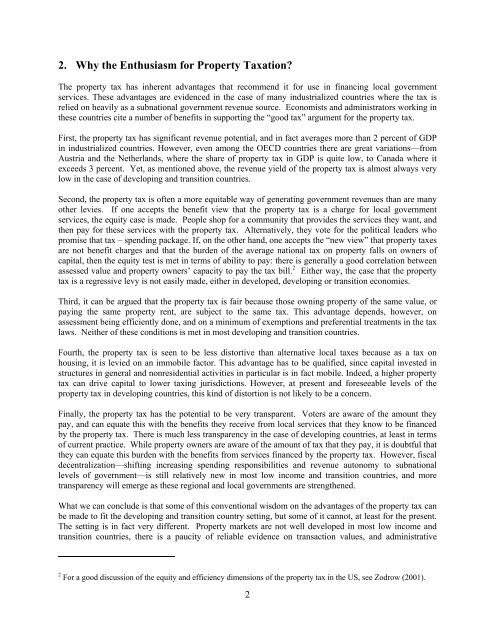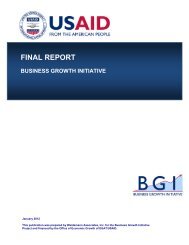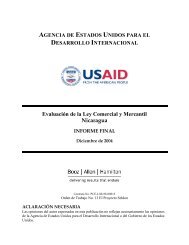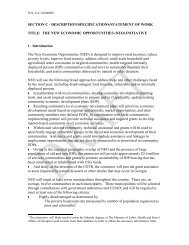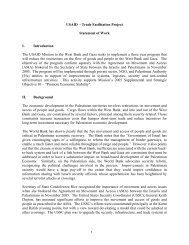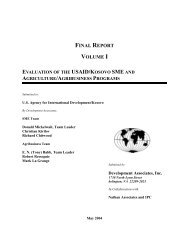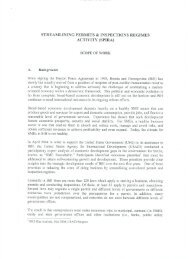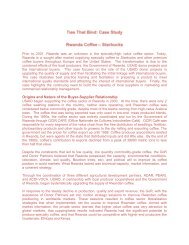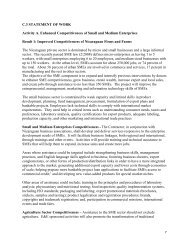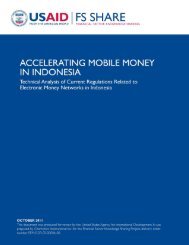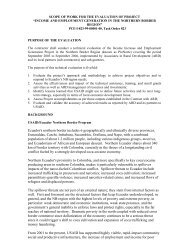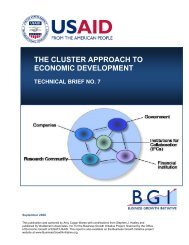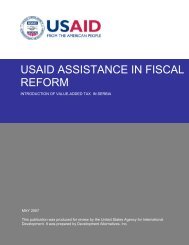Property Tax Reform in Developing and Transition Countries
Property Tax Reform in Developing and Transition Countries
Property Tax Reform in Developing and Transition Countries
Create successful ePaper yourself
Turn your PDF publications into a flip-book with our unique Google optimized e-Paper software.
2. Why the Enthusiasm for <strong>Property</strong> <strong>Tax</strong>ation<br />
The property tax has <strong>in</strong>herent advantages that recommend it for use <strong>in</strong> f<strong>in</strong>anc<strong>in</strong>g local government<br />
services. These advantages are evidenced <strong>in</strong> the case of many <strong>in</strong>dustrialized countries where the tax is<br />
relied on heavily as a subnational government revenue source. Economists <strong>and</strong> adm<strong>in</strong>istrators work<strong>in</strong>g <strong>in</strong><br />
these countries cite a number of benefits <strong>in</strong> support<strong>in</strong>g the “good tax” argument for the property tax.<br />
First, the property tax has significant revenue potential, <strong>and</strong> <strong>in</strong> fact averages more than 2 percent of GDP<br />
<strong>in</strong> <strong>in</strong>dustrialized countries. However, even among the OECD countries there are great variations—from<br />
Austria <strong>and</strong> the Netherl<strong>and</strong>s, where the share of property tax <strong>in</strong> GDP is quite low, to Canada where it<br />
exceeds 3 percent. Yet, as mentioned above, the revenue yield of the property tax is almost always very<br />
low <strong>in</strong> the case of develop<strong>in</strong>g <strong>and</strong> transition countries.<br />
Second, the property tax is often a more equitable way of generat<strong>in</strong>g government revenues than are many<br />
other levies. If one accepts the benefit view that the property tax is a charge for local government<br />
services, the equity case is made. People shop for a community that provides the services they want, <strong>and</strong><br />
then pay for these services with the property tax. Alternatively, they vote for the political leaders who<br />
promise that tax – spend<strong>in</strong>g package. If, on the other h<strong>and</strong>, one accepts the “new view” that property taxes<br />
are not benefit charges <strong>and</strong> that the burden of the average national tax on property falls on owners of<br />
capital, then the equity test is met <strong>in</strong> terms of ability to pay: there is generally a good correlation between<br />
assessed value <strong>and</strong> property owners’ capacity to pay the tax bill. 2 Either way, the case that the property<br />
tax is a regressive levy is not easily made, either <strong>in</strong> developed, develop<strong>in</strong>g or transition economies.<br />
Third, it can be argued that the property tax is fair because those own<strong>in</strong>g property of the same value, or<br />
pay<strong>in</strong>g the same property rent, are subject to the same tax. This advantage depends, however, on<br />
assessment be<strong>in</strong>g efficiently done, <strong>and</strong> on a m<strong>in</strong>imum of exemptions <strong>and</strong> preferential treatments <strong>in</strong> the tax<br />
laws. Neither of these conditions is met <strong>in</strong> most develop<strong>in</strong>g <strong>and</strong> transition countries.<br />
Fourth, the property tax is seen to be less distortive than alternative local taxes because as a tax on<br />
hous<strong>in</strong>g, it is levied on an immobile factor. This advantage has to be qualified, s<strong>in</strong>ce capital <strong>in</strong>vested <strong>in</strong><br />
structures <strong>in</strong> general <strong>and</strong> nonresidential activities <strong>in</strong> particular is <strong>in</strong> fact mobile. Indeed, a higher property<br />
tax can drive capital to lower tax<strong>in</strong>g jurisdictions. However, at present <strong>and</strong> foreseeable levels of the<br />
property tax <strong>in</strong> develop<strong>in</strong>g countries, this k<strong>in</strong>d of distortion is not likely to be a concern.<br />
F<strong>in</strong>ally, the property tax has the potential to be very transparent. Voters are aware of the amount they<br />
pay, <strong>and</strong> can equate this with the benefits they receive from local services that they know to be f<strong>in</strong>anced<br />
by the property tax. There is much less transparency <strong>in</strong> the case of develop<strong>in</strong>g countries, at least <strong>in</strong> terms<br />
of current practice. While property owners are aware of the amount of tax that they pay, it is doubtful that<br />
they can equate this burden with the benefits from services f<strong>in</strong>anced by the property tax. However, fiscal<br />
decentralization—shift<strong>in</strong>g <strong>in</strong>creas<strong>in</strong>g spend<strong>in</strong>g responsibilities <strong>and</strong> revenue autonomy to subnational<br />
levels of government—is still relatively new <strong>in</strong> most low <strong>in</strong>come <strong>and</strong> transition countries, <strong>and</strong> more<br />
transparency will emerge as these regional <strong>and</strong> local governments are strengthened.<br />
What we can conclude is that some of this conventional wisdom on the advantages of the property tax can<br />
be made to fit the develop<strong>in</strong>g <strong>and</strong> transition country sett<strong>in</strong>g, but some of it cannot, at least for the present.<br />
The sett<strong>in</strong>g is <strong>in</strong> fact very different. <strong>Property</strong> markets are not well developed <strong>in</strong> most low <strong>in</strong>come <strong>and</strong><br />
transition countries, there is a paucity of reliable evidence on transaction values, <strong>and</strong> adm<strong>in</strong>istrative<br />
2 For a good discussion of the equity <strong>and</strong> efficiency dimensions of the property tax <strong>in</strong> the US, see Zodrow (2001).<br />
2


